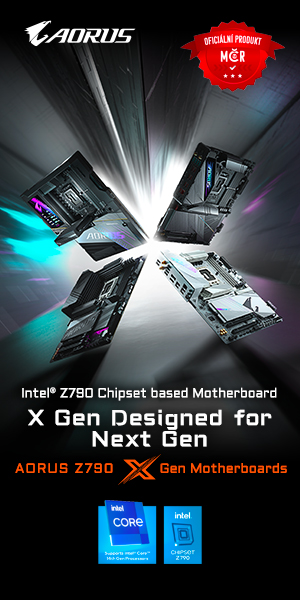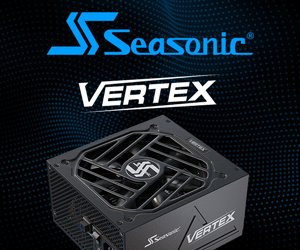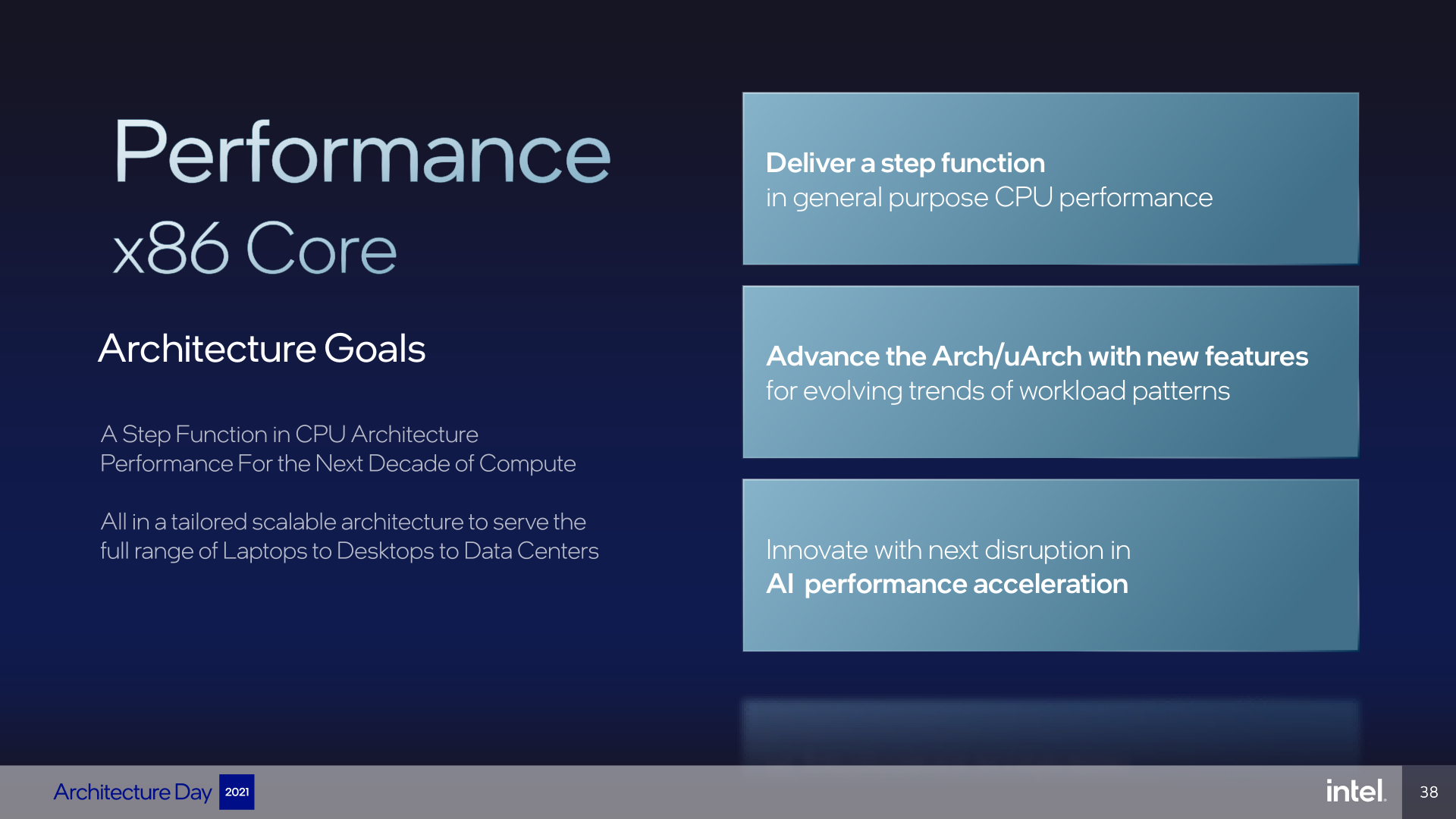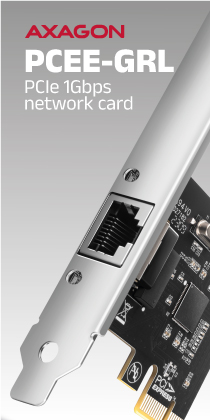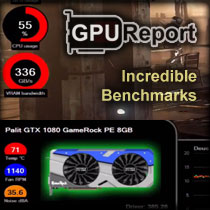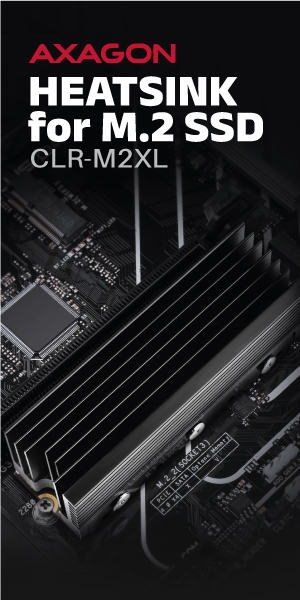Fruits of wider core: 19% better performance per MHz
Intel’s Alder Lake CPUs are poised to be the biggest hardware event this year. Intel has unveiled the core architecture of these CPUs and we have analysed the details and new improvements inside. There’s promise of huge performance and one of the biggest architectural leaps in x86 processors, for the first time with six parallel decoders and further IPC increases, showing Intel taking the same path as Apple’s highly effective cores.
As to how great the jump in performance that Intel achieved with all these architectural changes really is, we should really wait for independent reviews to fully gauge them, as always. That said, Intel offers their own estimate based on internal testing, for what it’s worth. While official benchmarks can often be deceptive due to cherry-picking the best scenarios, in this case the numbers do look like they might be reliable. According to Intel, Golden Cove has been measured to have 19% better IPC, or in other words 19% improved performance when running at the same frequency as the previous architecture.
Note that this IPC value represents an average calculated from many individual measurements. Intel bases it on benchmark results from subtests of SPEC CPU 2017, SYSmark 25, PCMark 10, WebXPRT13 and Geekbench 5.4.1. The results were taken on a Golden Cove core of an Alder Lake processor, which should mean that AVX-512 is not being used in these tests and we are talking about the client version of the core with just 1.25MB L2 cache capacity. The IPC gains are calculated against a Cypress Cove core from a desktop Rocket Lake processor, which should have AVX-512 active but also has a smaller 512KB L2 cache. Intel has tested both processors/cores at fixed 3.3 GHz clock frequency. What is not said if the RAM was the same, as Alder Lake can use DDR5 memory while Rocket Lake is limited to DDR4. The IPC results could quite possibly be influenced by the missing AVX-512 support in Alder Lake. We think that at least some of the measured subtests might actually be benefitting from AVX-512 when running on Rocket Lake, which would make the +19% iso-frequency performance achieved by Alder Lake without AVX-512 support more impressive. It’s therefore possible AVX-512 enabled core (or on the other hand the client core tested against Rocket Lake with disabled AVX-512) could have demonstrated a higher IPC gain going over 20 %, that would be more in line with the large resource increases in the core.

Even the 19% IPC increase is quite substantial however, being a bit higher than the 18% boost Intel has announced for their previous big microarchitecture update, which happened in Ice Lake/Sunny Cove core. We should probably emphasize once again that the number is a composite average, because in reality, the IPC of a CPU core varies from task to task based on the code and workload’s characteristics. As you can see in Intel’s graph which actually shows the individual (but not annotated) sub-results, there is a distribution of different IPC boost (performance per 1 MHz gain) values. Golden Cove doesn’t bring much or even suffers a performance regression in select few exceptions (which might be for various reasons, it can be explained by for example changes in prefetch behavior that happen to not fit the individual program and similar factors, but perhaps more likely is that these cases show the effect of the AVX-512 removal, meaning the IPC drops are in code that does use AVX-512 on the Rocket Lake and benefits from it).

And on the other hand, there are also results that greatly outpace the +19% average gain. The graph suggests there are some programs where Golden Cove/Alder Lake gains up to 60 % more performance at the same clock, compared to a Rocket Lake CPU core. It is likely these results represent programs that happen to have been greatly limited by some bottleneck that Golden Cove alleviated or were limited by some resource that Golden Cove increased, like L1 cache bandwidth, number of load ops possible per cycle, or the 16B Fetch limit in past cores that has been raised to 32 B.
Gaming performance will be determined by more factors than just the CPU core’s IPC
What this +19% value represents is also merely application software performance. Our readers will likely often be more interested in gaming performance instead, but in that particular case, we sadly can’t assume similar gains just based on the application software IPC, performance when driving GPUs in high-FPS gaming can show quite different results. Gaming performance is a specific and complex case that depends now just on raw single-threaded performance of a core, even if that is an important factor for it and Alder Lake shows strong potential in that, but also on L3 cache capacity, cache and memory latencies and even other factors.
The ability to use high-frequency DDR5 memory might help and the highest Alder Lake CPUs are rumored to offer promising 30MB L3 cache, significantly more than Core i9-11900K’s 16 MB or Core i9-10900K’s 20 MB. Therefore, while we don’t yet have an indication on what gaming performance to expect and how much better it will be compared to the current generation of Intel Core processors, it is safer to assume there will be good gains here, both compared to Rocket Lake and versus AMD’s Ryzen 5000 processors.
Intel does claim Alder Lake should be the fastest gaming CPU and it is reasonable to hope or even expect it to achieve performance leadership in this area for Intel.
Performance in application software likely to be excellent
Regardless of games, the single-thread performance metric will be excellent with Alder Lake processors, that seems to be more or less certain. It seems clear that single-thread performance will end up on a higher level than what is achieved by fastest Zen 3 processors (AMD Ryzen 9 5900X, Ryzen 9 5950X), and the percentage gap could be considerable. Alder Lake processors seem poised to also significantly outperform Apple’s M1 processor in single-thread performance and in turn somewhat take the steam out of the narrative of all the “End of x86 is nigh” prophets.That said, the Cuppertino company might also field its own new processor architecture soon, which means we can’t rule out the possibility that Intel’s decisive win will be beaten back shortly after.
And this time, Alder Lake shouldn’t have just this high single-thread performance under its belt, but also offer high multithreading performance, which will rely on the addition of the “little” Gracemont cores. Alder Lake will offer up to 16 core configurations thanks to Gracemont’s help, although they will offer just 24 threads as the Gracemont cores won’t support HT. In a few days, we will analyse this “little” core’s microarchitecture as well, but we can already say that these cores are going to contribute significantly more multithreading performance than many observers were giving them credit for. It seems the “little core” monicker isn’t really fitting at all and thus performance expectations made based on assumption that Gracemont will serve a role similar to ARM Cortex-A55 in mobile chips understandably fell short.
In any case, both Alder Lake processors and the Golden Cove core microarchitecture look very promising. It seems that they will prove the opinions that Intel’s position as technology leader is merely a thing of the past and that the company lives on inertia and borrowed time while being in the process of inevitable downfall (and so on) to be mistaken. On the contrary, if Alder Lake confirms the impressive microarchitectural strength in practice, it will show that Intel’s processor portfolio will remain a relevant force to be reckoned with into the future.
Alder Lake seems to be on track to move the state of the art in PC processors forward significantly compared to where the technology has been a year before. And that’s actually exactly what we ask for.
Jan Olšan, editor for Cnews.cz
- Contents
- Golden Cove Architecture: highest-performance Frontend in the history of x86 cores
- Expansion in computing units and expansion of the „window“
- FPU & SIMD units: AMX for Xeons, AVX-512 is dead in Alder Lake
- Fruits of wider core: 19% better performance per MHz



